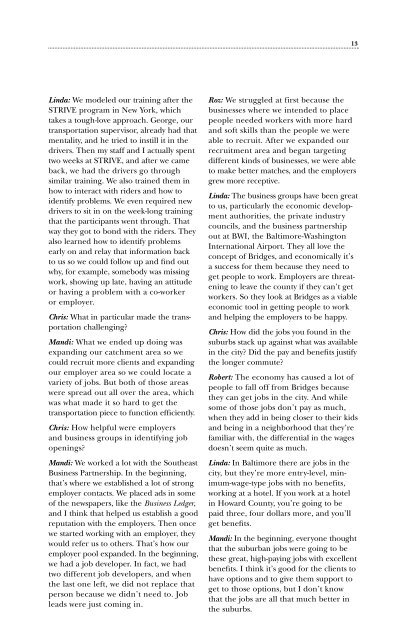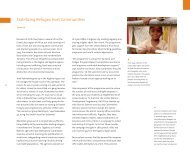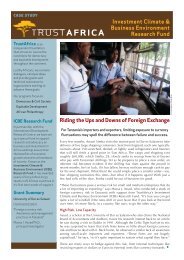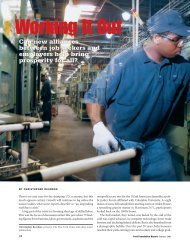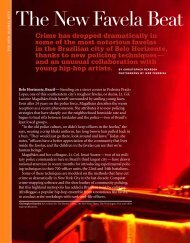In the Driver's Seat - christopher reardon
In the Driver's Seat - christopher reardon
In the Driver's Seat - christopher reardon
- No tags were found...
Create successful ePaper yourself
Turn your PDF publications into a flip-book with our unique Google optimized e-Paper software.
13Linda: We modeled our training after <strong>the</strong>STRIVE program in New York, whichtakes a tough-love approach. George, ourtransportation supervisor, already had thatmentality, and he tried to instill it in <strong>the</strong>drivers. Then my staff and I actually spenttwo weeks at STRIVE, and after we cameback, we had <strong>the</strong> drivers go throughsimilar training. We also trained <strong>the</strong>m inhow to interact with riders and how toidentify problems. We even required newdrivers to sit in on <strong>the</strong> week-long trainingthat <strong>the</strong> participants went through. Thatway <strong>the</strong>y got to bond with <strong>the</strong> riders. Theyalso learned how to identify problemsearly on and relay that information backto us so we could follow up and find outwhy, for example, somebody was missingwork, showing up late, having an attitudeor having a problem with a co-workeror employer.Chris: What in particular made <strong>the</strong> transportationchallenging?Mandi: What we ended up doing wasexpanding our catchment area so wecould recruit more clients and expandingour employer area so we could locate avariety of jobs. But both of those areaswere spread out all over <strong>the</strong> area, whichwas what made it so hard to get <strong>the</strong>transportation piece to function efficiently.Chris: How helpful were employersand business groups in identifying jobopenings?Mandi: We worked a lot with <strong>the</strong> Sou<strong>the</strong>astBusiness Partnership. <strong>In</strong> <strong>the</strong> beginning,that’s where we established a lot of strongemployer contacts. We placed ads in someof <strong>the</strong> newspapers, like <strong>the</strong> Business Ledger,and I think that helped us establish a goodreputation with <strong>the</strong> employers. Then oncewe started working with an employer, <strong>the</strong>ywould refer us to o<strong>the</strong>rs. That’s how ouremployer pool expanded. <strong>In</strong> <strong>the</strong> beginning,we had a job developer. <strong>In</strong> fact, we hadtwo different job developers, and when<strong>the</strong> last one left, we did not replace thatperson because we didn’t need to. Jobleads were just coming in.Roz: We struggled at first because <strong>the</strong>businesses where we intended to placepeople needed workers with more hardand soft skills than <strong>the</strong> people we wereable to recruit. After we expanded ourrecruitment area and began targetingdifferent kinds of businesses, we were ableto make better matches, and <strong>the</strong> employersgrew more receptive.Linda: The business groups have been greatto us, particularly <strong>the</strong> economic developmentauthorities, <strong>the</strong> private industrycouncils, and <strong>the</strong> business partnershipout at BWI, <strong>the</strong> Baltimore-Washington<strong>In</strong>ternational Airport. They all love <strong>the</strong>concept of Bridges, and economically it’sa success for <strong>the</strong>m because <strong>the</strong>y need toget people to work. Employers are threateningto leave <strong>the</strong> county if <strong>the</strong>y can’t getworkers. So <strong>the</strong>y look at Bridges as a viableeconomic tool in getting people to workand helping <strong>the</strong> employers to be happy.Chris: How did <strong>the</strong> jobs you found in <strong>the</strong>suburbs stack up against what was availablein <strong>the</strong> city? Did <strong>the</strong> pay and benefits justify<strong>the</strong> longer commute?Robert: The economy has caused a lot ofpeople to fall off from Bridges because<strong>the</strong>y can get jobs in <strong>the</strong> city. And whilesome of those jobs don’t pay as much,when <strong>the</strong>y add in being closer to <strong>the</strong>ir kidsand being in a neighborhood that <strong>the</strong>y’refamiliar with, <strong>the</strong> differential in <strong>the</strong> wagesdoesn’t seem quite as much.Linda: <strong>In</strong> Baltimore <strong>the</strong>re are jobs in <strong>the</strong>city, but <strong>the</strong>y’re more entry-level, minimum-wage-typejobs with no benefits,working at a hotel. If you work at a hotelin Howard County, you’re going to bepaid three, four dollars more, and you’llget benefits.Mandi: <strong>In</strong> <strong>the</strong> beginning, everyone thoughtthat <strong>the</strong> suburban jobs were going to be<strong>the</strong>se great, high-paying jobs with excellentbenefits. I think it’s good for <strong>the</strong> clients tohave options and to give <strong>the</strong>m support toget to those options, but I don’t knowthat <strong>the</strong> jobs are all that much better in<strong>the</strong> suburbs.


